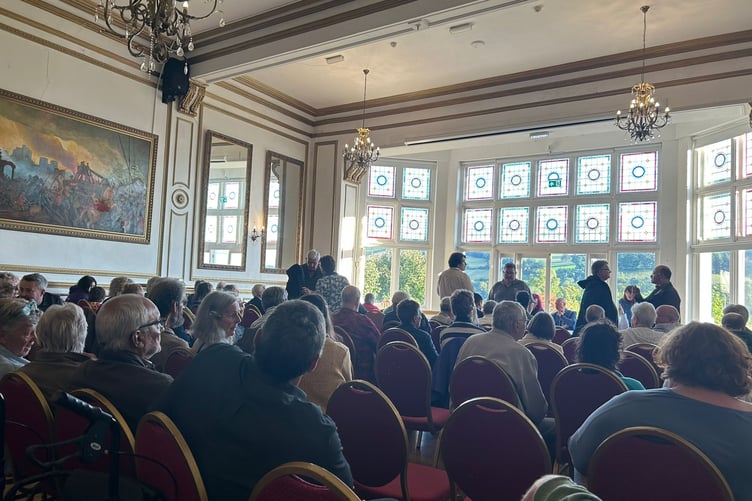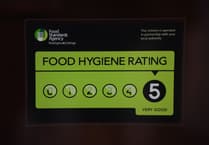Last night, the elegant ballroom of the Castle Hotel in Brecon was filled with concerned residents for a well-attended public meeting.
The community had gathered in force to voice their apprehensions about proposed temporary changes to local health services by Powys Teaching Health Board.
The atmosphere was charged with a sense of urgency as the people of Brecon and its surrounding areas shared their worries about how these changes could impact healthcare access and quality.
But this was no baying mob - this was a concerned Brecon.
The most illuminating parts of the evening came during the second half, when the microphone was handed over to the floor, and the audience had the chance to express their views.
The meeting had been called by the Powys Liberal Democrats - this was the third meeting of four. Two had already taken place in Llanidloes and Machynlleth, with the meeting in Llandrindod Wells set to take place this evening.
In attendance from the health board was Chief Executive, Hayley Thomas; Chair, Karl Cooper; Assistant Medical Director, Dr Richard Stratton and Assistant Director of Community Services, David Farnsworth.
After opening remarks from Jane Dodds MS and David Chadwick MP, who called for a pause to the proposals, it was the health board’s chance to take the floor.
Ms Thomas laid out the health board’s proposals and justifications - that is, the temporary cuts to Brecon and Llandrindod MIU opening times, and the changes to inpatient services at Bronllys and Llanidloes, Brecon and Newtown.
These changes in Bronllys and Llanidloes, which would be “Ready to Go Home units”, have been labelled by opponents as a “downgrading” of services - and unfortunately been somewhat lost in the noise of the MIU proposals.
We were told how Brecon’s MIU sees on average 1.4 patients per night and Llandod’s just 1.9. Brecon’s MIU had to close 50 times between January and May because of staffing issues.
The financial situation at the health board was also laid bare.
“We currently expect that we will end this financial year with a deficit of £22.9m - and that’s based on us achieving savings of £9.9m,” said Ms Thomas.
Jane Dodds then asked why it took a political party to organise a meeting - and why the health board didn’t set up a meeting of this nature themselves with the affected community.
This question would go unanswered.
One of the major concerns shared by many in the room was summed up by Ms Dodds - a worry that these changes were the “thin end of the wedge” and would lead to more cuts.
There was talk from Ms Thomas about making the MIU opening hours “more reliable” over that six-month period, so it didn’t have to close as regularly as it currently does.
This point was later contested by Cllr Sian Drinan (St David Ward): “It’s easy to be reliable when you’re closed, isn’t it?”
“It’s not a valid argument,” she said, defiantly.
James Evans MS and Cllr Matthew Dorrance both spoke passionately about local healthcare services and both received appreciative applause from the audience.
Cllr Trish Fretten (St Mary Ward) summed up what appeared to be many people’s thoughts: “What people want is access to frontline services - and they would welcome, at the same time, a reduction in the bureaucracy.”
This was met with a large applause and mutterings of agreement.
Throughout the evening, the health board representatives reiterated that community hospitals do not provide acute care.
They said there is a misconception that MIUs are “mini A&Es”.
“By definition the Minor Injury Units are there to treat minor injuries,” said Dr Stratton.
This reflects what was said in a letter sent the B&R from Ms Thomas last week.
There was a big drive on the night from all present in encouraging people to take part in the consultation.
The content of that consultation will form a report which gets put to the board in October - which will be judgement day.
The consultation closes on September 8, so if you would like to have your say, make your voice heard before then.
Another big takeaway from the night was one of the potential pitfalls of the current NHS 111 service. Many people remarked that NHS 111 seems very quick to send people to A&E as a first port of call. There was a consensus among many attendees that they were being told via 111 that Brecon MIU was closed when in reality, it wasn’t, and then being directed to an A&E. The health board would look into this, they said.
When the microphone was put to public, there were more than a dozen well informed points made by passionate people.
The floor heard from many people working in the healthcare sector - some still working and some retired - as well as those who have used the service.
This included a member of the audience saying that the downgrading of services at Bronllys hospital was being “hidden behind” the MIU opening hour cuts.
There was real emotion beneath many of the lines of questioning. What shone through time and time again was how much the people of Brecon care.
Something that was raised on half a dozen occasions was the concern that the changes would not be “temporary” - and questions over exactly what “temporary” meant beyond the six-month timeframe. As I left the room after the near two-hour public meeting came to a close, I must admit I did not feel any more confident about the answer.
I had asked the health board around fortnight ago to clarify whether the changes are indeed temporary and what conditions would need to be met for services to return to their previous levels. I received a spokesperson response which addressed other questions in my email but nothing which properly answered this.
On the night, we also heard from a lady who works for Shropdoc, who said she only found out about the initial news of the proposals via Facebook. She said that not having nurses at Brecon overnight, especially between 8pm and midnight, would be a problem as it can get quite busy. A lot that happens isn’t recorded and would not show up on data, she added. She also reiterated the opinion that 111 is directing too many people to A&Es.
“The one or two cases Brecon (MIU) gets each night are often the difficult ones - sometimes mental health - and the support our nurses give those is amazing,” she said.
There was also a point raised about the health board providing better data to match up with their proposals - something the health board said that would look into.
Andrew Powell then asked: “Why can’t we bite the bullet and build a general hospital in Powys?”
Dr Stratton said, in as many words, that this would not be feasible.
Richard Hall, who had taken Andrew to hospital after he was stung hundreds of times by wasps in his garden this month, made a number of strong points.
He said that during the ordeal he had phoned the ambulance and asked them how long they were going to be, to which they said they didn’t know. The main roads at the time to both Abergavenny and Merthyr were closed, he said, making a trip to A&E, as suggested, not possible.
“They then told me to pull over and wait in a lay-by,” said Richard.
“There’s no grey area here - the MIU saved Andrew’s life.”
One of the loudest cheers of the evening came following a question from former Powys County Council leader Rosemarie Harris, sat just behind me.
Ms Harris said that in recent years, when money needs to be saved, it seems to be frontline services that are cut. She said that she believes the NHS, generally, is “over-managed”.
She then asked Ms Thomas directly if she thought the health board was over-managed.
Ms Thomas said the health board has focused on “year-on-year percentage reductions in general administration management costs” - but there are some roles that are mandatory for the running of the health board.
“This won’t be popular, but I’ve worked in a number of health boards, and I believe that the (Powys) health board is lean, in terms of size of teams and what we do,” said Ms Thomas.
Chair Karl Cooper, who had remained silent during the meeting, closed off the proceedings.
“My role is not to commend or defend the proposals - this engagement process needs to be one of integrity,” he said.
He said that the public’s input will be given “proper and conscientious consideration”.
So what can we take away from this?
The depth of concern was evident, with so many questions raised that only a few could be addressed within the time or space of this article.
As the meeting concluded, it was clear that the concerns of Brecon's residents are far from resolved. Powys Teaching Health Board has committed to considering the community's feedback, but for many, the future of local healthcare remains uncertain
What exactly the future holds, I’m not sure.
But what is most important at this moment in time is to respond to the health board’s consultation ahead of the September 8 deadline: https://www.haveyoursaypowys.wales/temporary





Comments
This article has no comments yet. Be the first to leave a comment.